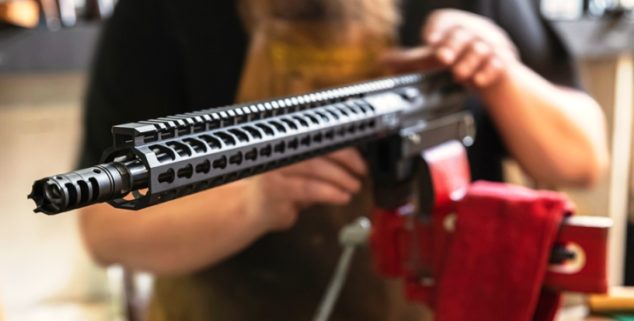News
Amid Covid and crime fears, Californians stocked up on guns
 A gunsmith works on a 300 Blackout AR rifle in a Placerville gun shop.(Photo: SvetlanaSF, via Shutterstock)
A gunsmith works on a 300 Blackout AR rifle in a Placerville gun shop.(Photo: SvetlanaSF, via Shutterstock)California may well have the toughest gun laws in the country, but criminals still get automatic weapons and everyday people still head to the gun store in times of trouble.
And the pandemic with its parade of woes has motivated thousands of first-time gun buyers.
It turns out, while some Californians hoarded toilet paper and hand sanitizer, others bulked up on firepower.
Nearly half of those who bought a gun during the pandemic had never owned one before.
In 2020, as scientists raced to create a Covid vaccine, more than 110,000 Californians purchased new guns. And 400,000 residents added to their caches of ammunition. They may or may not have taken steps against Covid, but they certainly wanted protection “from people.”
About 3 of 4 new gun owners said they needed a weapon as defense against “general lawlessness.”
Half the gun buyers feared “government going too far” and half feared government would “collapse.”
More than half of gun buyers pointed to criminal justice reforms and said they wanted protection against “early prisoner release.”
Nearly half of those who bought a gun during the pandemic had never owned one before.
Meanwhile, thousands of existing gun owners began storing their guns loaded and unlocked during what they perceived as a period of heightened danger.
In a state with 40 million people and 20 million guns, of course, everyone faces some risk of gun violence.
Those are findings from the California Safety and Wellbeing Survey by the California Firearm Violence Research Center at UC Davis.
“Knowing whether someone owns a firearm tells us a lot about their risk for injury,” according to researchers. Although people buy guns to make themselves safer, “owning firearms increases risk of firearm injury.”
In a state with 40 million people and 20 million guns, of course, everyone faces some risk of gun violence.
That’s why California remains at the front of the pack when it comes to gun control. And California does indeed have “the most stringent firearm laws in the country,” according to Veronica Pear, a PhD at the Violence Prevention Research Program.
“Our focus is on the issue of criminals getting guns and the havoc they wreak.” — Greg Totten
But those laws don’t necessarily reduce risk, and they appear to have little effect on actual crime. And in at least one instance, the punishment for a felon in possession of a firearm, California actually trails Texas, long viewed as a gun-happy state.
“The issue from a prosecutor’s perspective, setting aside the debate over gun control in general, is the reality that criminals have easy access to guns,” said Greg Totten, CEO of the California District Attorneys Association. “Criminals are going to get guns no matter what.”
“Our focus,” Totten said of prosecutors, “is on the issue of criminals getting guns and the havoc they wreak.”
Adding layers of laws atop an already dense regulatory structure will not, in Totten’s opinion, keep guns from criminals.
He adds, though, that laws prohibiting ownership among riskier groups, like domestic violence perpetrators, “are good laws. They are going to help.”
The Armed and Prohibited Persons System, yielded fewer than 1,500 confiscations in 2021, a relative drop in the bucket.
Since 2016, California has given worried friends and relatives a legal way to take guns from someone who might be inclined to hurt themselves or someone else. It is one of 19 states with such laws.
Trouble is, most people (66 percent) have never heard of a Gun Violence Restraining Order.
But when researchers explained the law, nearly 3 out of 4 respondents agreed it’s at least sometimes wise to separate a gun owner from their gun, even if only temporarily.
The state Department of Justice also has a program to get guns away from felons and others who shouldn’t have them. But APPS, the Armed and Prohibited Persons System, yielded fewer than 1,500 confiscations in 2021, a relative drop in the bucket.
Nearly half of gun owners (43 percent) are older than 60, and more than half (64 percent) are white.
UC researchers say, despite its anti-gun reputation, California is similar to other states when it comes to ownership patters. We may own somewhat fewer guns per capita than some other states, but we buy them and keep them for the same reasons.
Californians buy more rifles than handguns. They are much more likely to buy for self protection than for hunting or sport. And households with income greater than $100,000 are more likely than not to own at least one gun.
Men are almost three times as likely as women to own one. Nearly half of gun owners (43 percent) are older than 60, and more than half (64 percent) are white.
“Compared with the U.S. as a whole,” UC Davis researchers concluded, “California has lower prevalence of firearm ownership but similar demographic patterns of ownership, reasons for ownership, and trends in acquisition.”
Want to see more stories like this? Sign up for The Roundup, the free daily newsletter about California politics from the editors of Capitol Weekly. Stay up to date on the news you need to know.
Sign up below, then look for a confirmation email in your inbox.

Leave a Reply